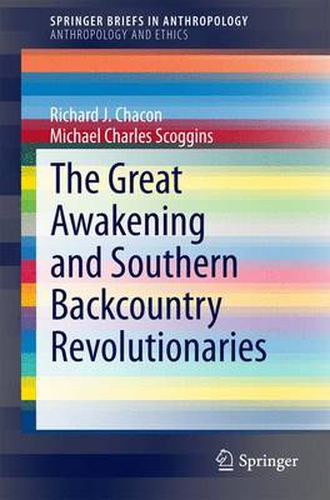Readings Newsletter
Become a Readings Member to make your shopping experience even easier.
Sign in or sign up for free!
You’re not far away from qualifying for FREE standard shipping within Australia
You’ve qualified for FREE standard shipping within Australia
The cart is loading…






This title is printed to order. This book may have been self-published. If so, we cannot guarantee the quality of the content. In the main most books will have gone through the editing process however some may not. We therefore suggest that you be aware of this before ordering this book. If in doubt check either the author or publisher’s details as we are unable to accept any returns unless they are faulty. Please contact us if you have any questions.
This work documents the impact that the Great Awakening had on the inhabitants of colonial America’s Southern Backcountry. Special emphasis is placed on how this religious revival furrowed the ground on which the seeds of the American Revolution would sprout. The investigation shows how the Great Awakening can be traced to the Europe’s Age of Enlightenment. This effort also demonstrates how and why this revival spread so rapidly throughout the colonies. Special focus is placed on how the Great Awakening impacted the mindset of colonists of the Southern Backcountry. Most significantly, this research demonstrates how this 18thcentury revival not only cultivated a sense of American national identity, but how it also fostered a colonial mindset against established authority which, in turn, facilitated the success of the American Revolution. Additionally, this investigation will document (from a cross-cultural perspective) how religious revivals have fueled other revolutionary movements around the world. Such analysis will include the Celtic Druid Revolt, the Maji-Maji Rebellion of East Africa along with the Mad Man’s War in Southeast Asia. Lastly, the ethical ramifications of minimizing (or denying) the role that religion played in political and social transformations around the world will be addressed. This final point is of paramount importance given current trend in academia to minimize the role that religion played in spurring revolutions while emphasizing material (i.e. economic) causal factors. This attempt at divorcing religion from history is misguided and unethical because it is not only misleading but it also fails to fully acknowledge the beliefs and values that motivated individuals to take certain actions in the first place.
$9.00 standard shipping within Australia
FREE standard shipping within Australia for orders over $100.00
Express & International shipping calculated at checkout
This title is printed to order. This book may have been self-published. If so, we cannot guarantee the quality of the content. In the main most books will have gone through the editing process however some may not. We therefore suggest that you be aware of this before ordering this book. If in doubt check either the author or publisher’s details as we are unable to accept any returns unless they are faulty. Please contact us if you have any questions.
This work documents the impact that the Great Awakening had on the inhabitants of colonial America’s Southern Backcountry. Special emphasis is placed on how this religious revival furrowed the ground on which the seeds of the American Revolution would sprout. The investigation shows how the Great Awakening can be traced to the Europe’s Age of Enlightenment. This effort also demonstrates how and why this revival spread so rapidly throughout the colonies. Special focus is placed on how the Great Awakening impacted the mindset of colonists of the Southern Backcountry. Most significantly, this research demonstrates how this 18thcentury revival not only cultivated a sense of American national identity, but how it also fostered a colonial mindset against established authority which, in turn, facilitated the success of the American Revolution. Additionally, this investigation will document (from a cross-cultural perspective) how religious revivals have fueled other revolutionary movements around the world. Such analysis will include the Celtic Druid Revolt, the Maji-Maji Rebellion of East Africa along with the Mad Man’s War in Southeast Asia. Lastly, the ethical ramifications of minimizing (or denying) the role that religion played in political and social transformations around the world will be addressed. This final point is of paramount importance given current trend in academia to minimize the role that religion played in spurring revolutions while emphasizing material (i.e. economic) causal factors. This attempt at divorcing religion from history is misguided and unethical because it is not only misleading but it also fails to fully acknowledge the beliefs and values that motivated individuals to take certain actions in the first place.